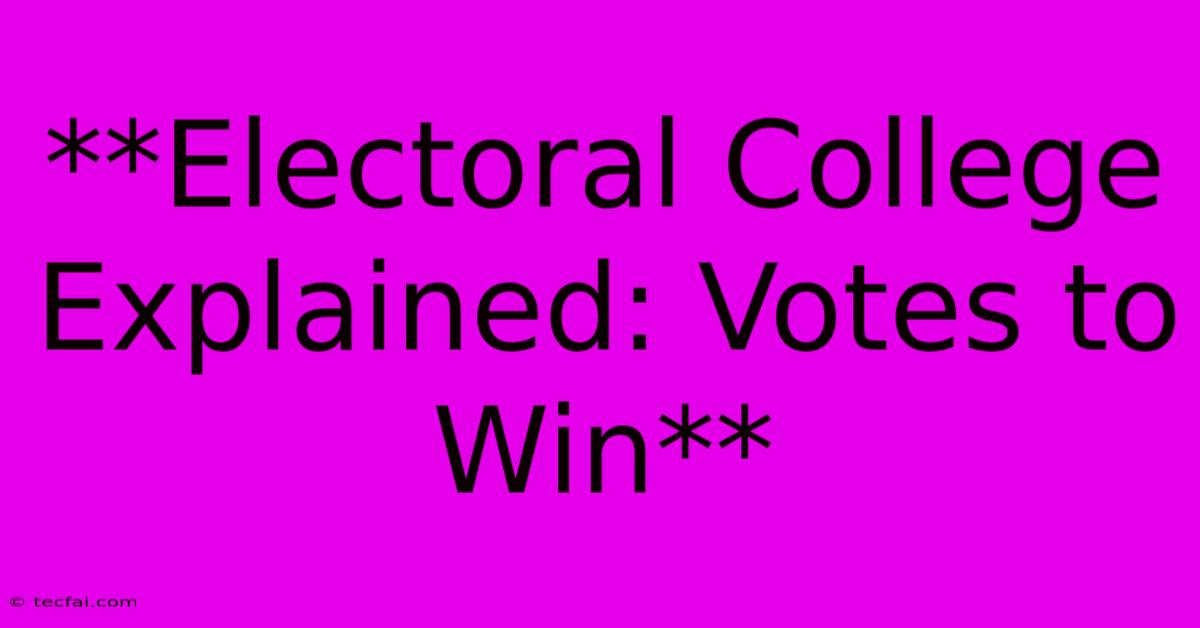**Electoral College Explained: Votes To Win**

Discover more detailed and exciting information on our website. Click the link below to start your adventure: Visit Best Website tecfai.com. Don't miss out!
Table of Contents
Electoral College Explained: Votes to Win
The United States presidential election is a complex process, and understanding the Electoral College is crucial for comprehending how a candidate wins the presidency. This article delves into the mechanics of the Electoral College, explaining how it works and its impact on the election outcome.
Understanding the System
The Electoral College is a body of electors established by the United States Constitution, constituted every four years for the sole purpose of electing the president and vice president of the United States. Here's how it functions:
- Electors are chosen by each state based on the combined total of its senators and representatives in Congress. This means each state has a specific number of electoral votes.
- The District of Columbia also has three electoral votes. This is because of the 23rd Amendment, which granted it the same number of electoral votes as the least populous state.
- There are 538 total electoral votes in the United States. A candidate needs to win at least 270 electoral votes to secure the presidency.
How it Works in Practice
- Each state holds a popular vote for president. The candidate who wins the popular vote in a state typically wins all of that state's electoral votes (with the exception of Maine and Nebraska, which use a proportional system).
- The candidate who wins the majority of electoral votes nationwide becomes the President. Even if a candidate loses the popular vote, they can still win the presidency by winning the necessary electoral votes.
Advantages and Disadvantages
The Electoral College has been a topic of debate for decades, with arguments both for and against its existence.
Arguments in favor of the Electoral College:
- Ensures representation for smaller states. Without the Electoral College, states with larger populations would likely dominate the election.
- Forces candidates to campaign in all parts of the country. To win the presidency, candidates need to secure electoral votes from a variety of states, not just large population centers.
- Prevents a "winner-take-all" scenario. The Electoral College system encourages candidates to focus on states where they can win the majority of votes, rather than trying to win every single vote nationwide.
Arguments against the Electoral College:
- A candidate can win the presidency without winning the popular vote. This has happened five times in U.S. history, most recently in 2016.
- It undermines the principle of "one person, one vote." The Electoral College system gives more weight to votes in certain states, which can lead to a distorted representation of the national popular vote.
- It can lead to a situation where a minority of voters elect the president. This is because a candidate can win a state by a small margin, but still win all of that state's electoral votes.
The Future of the Electoral College
The debate over the Electoral College is likely to continue for years to come. Some advocates for reform propose a national popular vote system, while others suggest modifications to the existing system. Regardless of the outcome, understanding the Electoral College is essential for understanding the complexities of the U.S. presidential election process.

Thank you for visiting our website wich cover about **Electoral College Explained: Votes To Win**. We hope the information provided has been useful to you. Feel free to contact us if you have any questions or need further assistance. See you next time and dont miss to bookmark.
Featured Posts
-
Us Election Key Indicators To Follow
Nov 05, 2024
-
Australian 3 D Network Firm Secures 45 M For Global Growth
Nov 05, 2024
-
Us Supreme Court Reviews Louisiana Voting Map
Nov 05, 2024
-
Buccaneers Chiefs Monday Night Key Takeaways
Nov 05, 2024
-
Ton Conference Did Durov Attend
Nov 05, 2024
